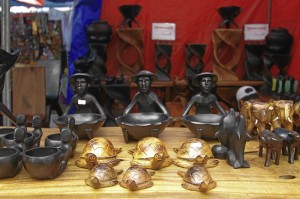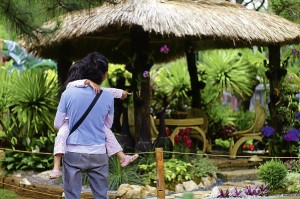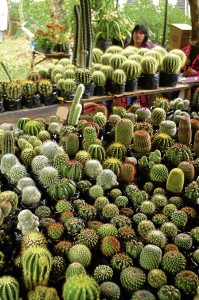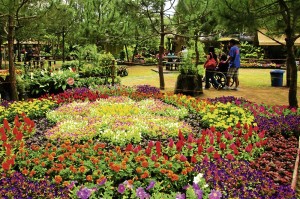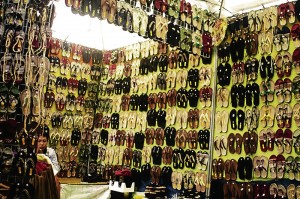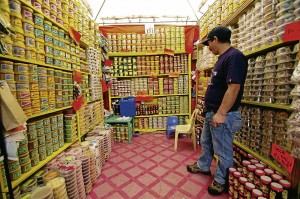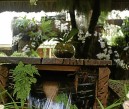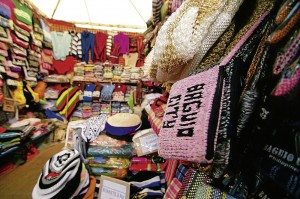Art, economics mix at Baguio’s Market Encounter
BAGUIO CITY—During the last week of January, John Kimo and his three companions started sorting scrap lumber, iron mesh, old cracked tiles and other stuff, which others might have used as firewood or discarded to end up at the city dump.
But these have become the building blocks in Kimo’s entry in this year’s landscaping competition dubbed “Market Encounter,” a major feature of the annual Panagbenga (Baguio Flower Festival).
“I used to only arrange flowers. But this landscaping competition has given me opportunities to improve my craft,” says Kimo, president of the Panagbenga Landscapers Association.
Kimo and 15 other artists have entries that display their skills in creating landscapes fusing what they see from their environment and from garden settings here and abroad.
For example, Kimo says he would surf the Internet for samples of Italian, English or Japanese gardens. These, he says, would give him ideas which he integrates with his own.
“The rest is instinct,” he says. “My carpentry, masonry, electrical, and hydraulic (use of water as in irrigation or water works) skills also come into play.”
The 16 landscape artists have two entries each in what is called the “open category” and the “carpet of flowers” competition.
A total of P700,000 is allotted as prizes for the top three winners of each category.
Win or lose, Kimo says the landscape entries can open opportunities for the artists and entrepreneurs like him. These include offers for landscaping contracts by clients, like hotel and resort owners.
Kimo, being adept also in flower arrangement, has been contracted by three participants in the Panagbenga’s flower floats parade on Feb. 26. Many participants in the parade are business establishments that can afford to spend as much as P250,000 to P500,000 for each floral float.
Generating income
Since they have to spend money for the cash prizes of winners for the landscaping, flower float parade and street dancing competitions, Panagbenga organizers have devised a way by which the festival could generate income.
One way is putting up business stalls in a section of Burnham Park where traders can sell various goods. This is the core of the “market encounter” idea, which integrates the landscaping component.
“The idea is to give entrepreneurs the opportunity to sell their goods, especially new locally made items, and meet potential clients, and thus expand their markers,” says lawyer Damaso Bangaoet Jr., Market Encounter head and the acknowledged founder of the Panagbenga.
An idea that has been institutionalized since 1997, the Market Encounter has enabled some traders to exhibit novelty items, which highlight Filipino ingenuity.
One such product is that of Benjamin Reponoya of Cebu City, who, together with his wife, Maria, manufactures handmade sandals for men, women and children.
The footwear items are made of nylon rope, abaca, jute sack and rubber. Some of the ladies’ and girls’ sandals are accented with coconut shells and beads.
The Cebu-made products are selling quite well here. “We would gross P2,000 to P3,000 on weekdays and this doubles on weekends,” Reponoya says.
Sales had dipped in Cebu and in other urban centers in the Visayas and Mindanao after other manufacturers copied the products of the Reponoyas and lowered their prices.
So Reponoya and his wife thought out a new strategy—to explore markets in Baguio and other parts of Luzon.
“To be on top of the competition, we have to continue to make new designs,” Reponoya says. “It is an advantage that my wife has kept abreast with the latest fashion trends in footwear, thanks to the Internet.”
Food wrapper, newspapers
During her spare time, Patricia Medez, a housewife from Barangay Bakakeng, makes bags from used plastic bags. She carefully rolls the bags and crochets them, transforming them into various designs of purses.
She also makes plant hangers out of the other rolled plastic bags.
Medez learned this skill from a workshop sponsored by the Shell Foundation and Plan International in 1996. “The idea is to convert these used plastic bags into something useful, otherwise, they end up clogging canals and waterways,” she says
She also displays samples of her daughter’s work—bags made of instant coffee wrappers. “These are especially attractive to foreigners,” she says.
Shopping bags and ladies’ accessories (bracelets, necklaces and earrings) made of rolled newspapers are among the novelty items at the Market Encounter.
“These products are produced by women, whom we trained to use their time in productive ventures rather than in idle gossip,” says Honey Umali Munsayac, a trainer on recycled newspaper craft.

A SET of ganza (gangsa or gongs) and a solibao (traditional percussion instrument) are among the items on display. The set sells for P30,000. PHOTOS BY RICHARD BALONGLONG/ INQUIRER NORTHERN LUZON











